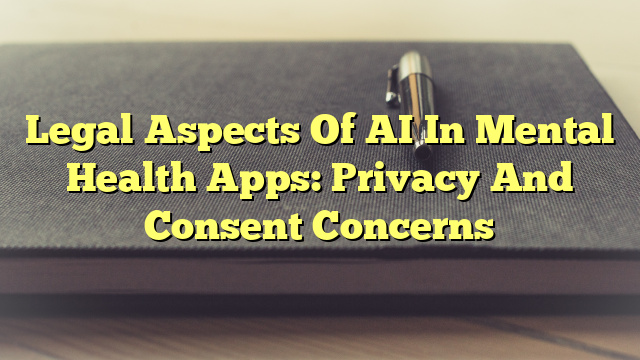Table of Contents
Privacy and Ethical Considerations of Artificial Intelligence
Artificial Intelligence (AI) brings numerous benefits to various industries, including mental health apps. However, along with these benefits come legal, privacy, and ethical considerations. Privacy is a fundamental right, and AI technologies must respect and protect individuals’ privacy.
When it comes to mental health apps, AI algorithms may process sensitive personal data, such as health records and behavioral patterns. It is crucial to ensure that this data is handled securely and in compliance with privacy laws and regulations.
Ethical considerations also play a significant role in AI applications. Developers and organizations must consider the potential biases and discrimination that AI algorithms may introduce. Transparent and accountable AI systems are essential to maintain trust and ensure fairness in mental health apps.
Main Legal Issues with AI
AI technologies pose several legal challenges, including:
- Intellectual property rights: AI-generated content raises questions about copyright ownership and infringement.
- Liability: Determining responsibility for AI decisions and actions can be complex, especially in cases where harm occurs.
- Data protection: AI algorithms rely on vast amounts of data, and complying with data protection laws, such as the General Data Protection Regulation (GDPR), is crucial.
- Privacy: AI applications must respect individuals’ privacy rights and ensure that personal data is collected, processed, and stored securely.
- Transparency: Users should be informed about the use of AI in mental health apps and have access to understandable explanations of how AI algorithms work.
Privacy Concerns Surrounding AI Applications
AI applications raise specific privacy concerns, including:
- Data collection: AI algorithms require access to personal data, and users must be aware of what data is collected and how it is used.
- Data sharing: Sharing personal data with third parties must be done with explicit consent and in compliance with applicable privacy laws.
- Data security: AI systems must implement robust security measures to protect personal data from unauthorized access, breaches, and cyberattacks.
- Secondary use of data: AI-generated insights and patterns may be valuable for research or commercial purposes, but individuals’ consent must be obtained before using their data for such purposes.
Privacy and Security Concerns of AI
AI technologies present unique privacy and security challenges, including:
- Algorithmic bias: AI algorithms can perpetuate biases and discrimination, leading to unfair outcomes in mental health apps.
- Data breaches: The large amounts of personal data processed by AI systems make them attractive targets for hackers and increase the risk of data breaches.
- User consent: Obtaining informed consent from users is crucial, and mental health apps must ensure that users understand how their data will be used and have the option to withdraw consent.
- Accountability: Establishing clear lines of accountability for AI decisions and actions is necessary to address potential harm and liability issues.
Conclusion
As AI continues to advance in mental health apps, it is essential to address the legal, privacy, and ethical considerations associated with these technologies. Protecting individuals’ privacy, ensuring data security, and promoting transparency and accountability are crucial for building trust and maintaining ethical standards in AI-powered mental health applications.

